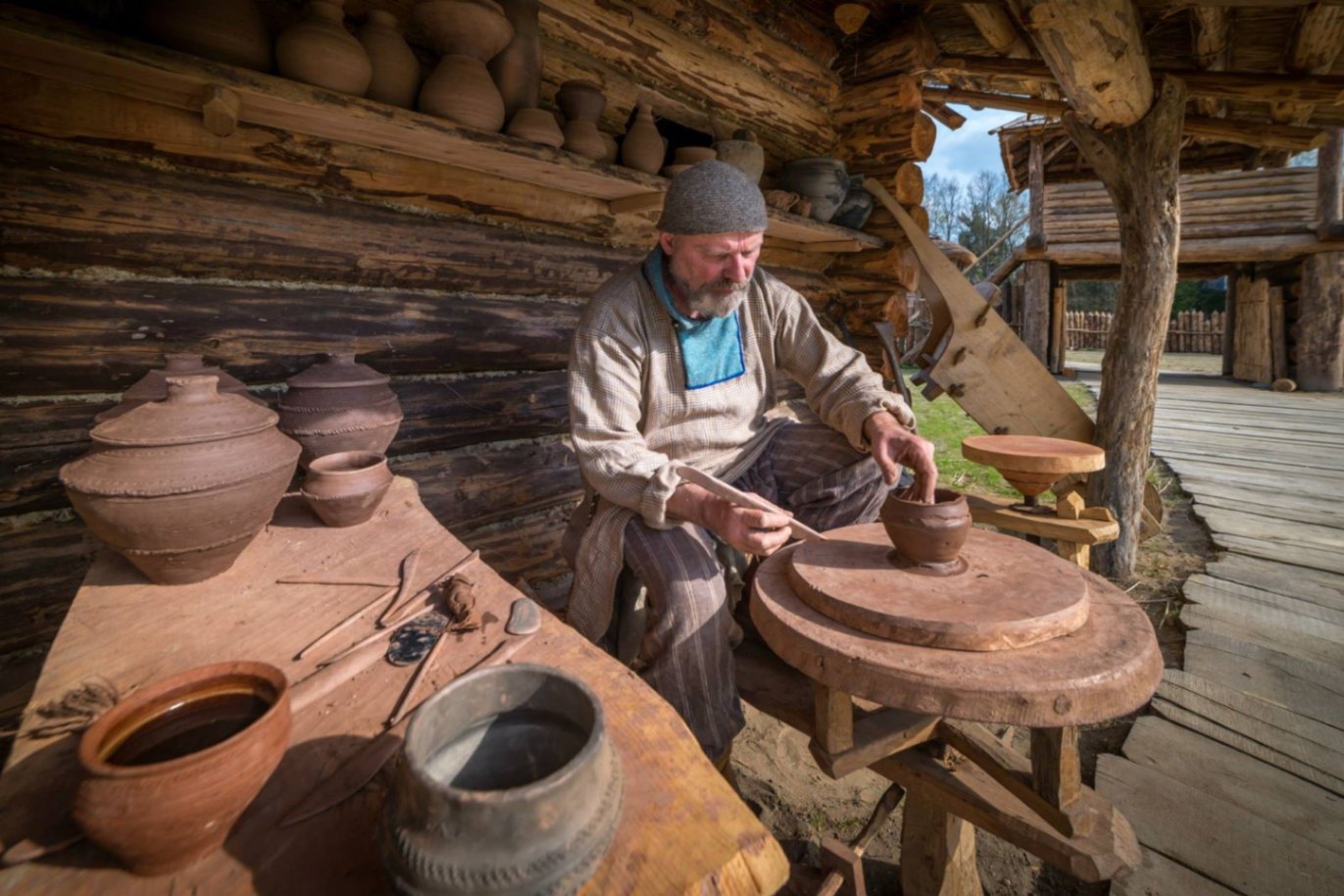Living History Lesson for Children and Youth - An Unconventional Form of Learning

Connecting History with Practice
Instead of theoretically learning about history, young people in the Sławutowo Settlement (Puck, Pomerania) have the opportunity for direct contact with the traditions and customs of the past. The workshops serve as a living history lesson, where participants can see firsthand the creative processes that took place in ancient times and even create items themselves using traditional methods.
Advantages of Craft Workshops
The craft workshops at Sławutowo Settlement are an excellent opportunity to immerse oneself in the history and culture of past times through hands-on experience. Participants not only have the chance to learn traditional techniques such as pottery, weaving, or felting but also develop manual skills that enhance concentration, patience, and creative thinking. These activities provide a deeper understanding of the daily life of centuries ago and offer the joy of creating one’s own handmade items in the atmosphere of a historical settlement.
Sławutowo Settlement - Living History Lessons - Craft Workshops
Sławutowo Settlement offers a variety of craft workshop packages tailored to different age groups, including preschool children and older youth. For the youngest (4-7 years old), there are packages that combine fun with learning, such as pottery workshops, felting, flatbread baking, as well as historical theater performances and games in a labyrinth. Older children and teens (7-19 years old) can take part in more advanced activities, such as pottery, weaving, or ambercraft, as well as visit the reconstructed medieval settlement and explore history in an interactive way. Each package is designed to ensure that participants not only acquire knowledge about history but also develop manual skills, creativity, and teamwork abilities.
Educational Benefits of Living History Lessons in Craft Workshops:
Developing Manual and Creative Skills
Participation in workshops like pottery, weaving, felting, or baking flatbreads allows children and youth to develop manual skills that are useful not only in a historical context but also in daily life. It teaches precision, patience, and the ability to handle tools, which in turn enhances motor coordination and technical abilities. Moreover, participants can bring their creative ideas to life by crafting items that will not only serve as souvenirs but also as proof of their creativity's growth.
Creativity and Imagination
Craft workshops are an excellent opportunity to stimulate imagination and develop creativity. Children and young people learn how to use available materials to create unique objects, encouraging experimentation with various techniques. Additionally, in the historical context, they have the chance to recreate ancient objects and understand their functions, which stimulates creative thinking and problem-solving skills. The unique experiences related to handcrafting, combining learning and fun, enable young people to express themselves artistically.
Problem-Solving and Teamwork Skills
During the craft workshops, young participants must make decisions regarding how to complete a specific task, such as how to shape pots, design patterns on fabric, or choose the appropriate felting method. These challenges teach problem-solving and help improve their craft. Moreover, in many activities, children work in groups, which allows them to develop cooperation skills, negotiation, and idea-sharing. These competencies are invaluable in later life, both in education and in professional or personal relationships.
Understanding the Value of Traditions and History
Handcrafting objects in a traditional way is not only a lesson in history but also a way to gain a deeper understanding of the values connected to traditions and culture. By engaging in such activities, young people begin to see how important the work of artisans was and how vital the skills passed down through generations were. Learning about ancient methods and understanding the historical context allows them to better immerse themselves in the lives of their ancestors and build respect for tradition. This, in turn, fosters a sense of responsibility for preserving cultural heritage.
Competencies Useful in Learning and Everyday Life
Living history lessons teach not only history but also competencies that are crucial in daily life. Developing manual and creative skills influences abilities like planning, organizing work, and perseverance. Furthermore, teamwork and problem-solving skills are invaluable both in education and later professional life. Children learn how to handle difficult tasks, work in groups, and respect time and resources, all of which contribute to their comprehensive development.
Summary
The craft workshops at Sławutowo Settlement provide not only a fascinating journey through time but also an excellent opportunity to develop skills that are useful in everyday life. By combining learning, creativity, and history, young people have the chance to gain valuable experiences that will help them grow both educationally and personally.

